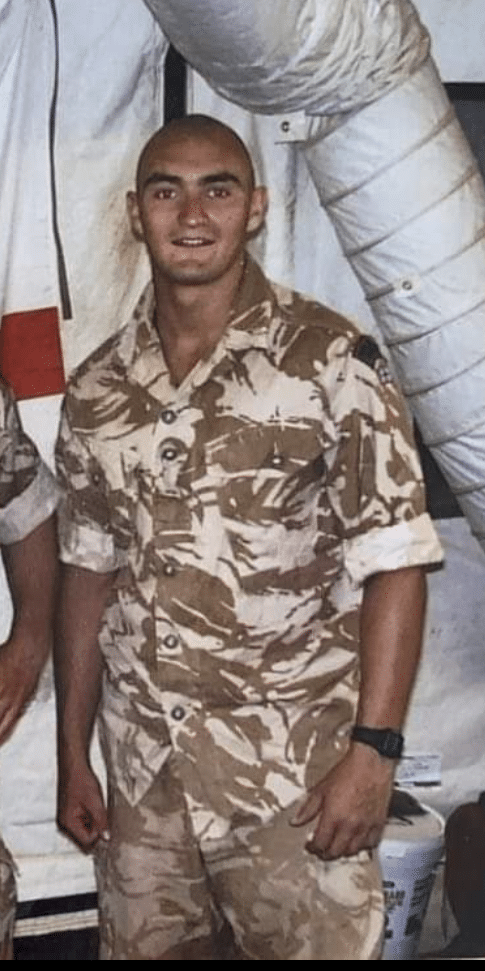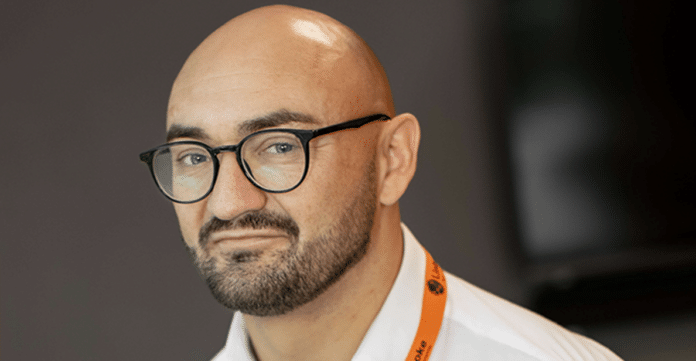Jason Garside, head of recruitment and training at Linbrooke Services, reflects on his transition from Royal Marine to rail professional – and explains how he is helping others to do the same.
Linbrooke Services’ head of recruitment and training, Jason Garside, still remembers receiving a PTS card and donning his oranges for the first time. It was a “turning point” for the former Royal Marine, whose military career had been cut short by injuries sustained in Afghanistan.
14 years later, Jason is still working at connectivity specialist Linbrooke Services, where he now helps other job seekers to transition into rail. Speaking to RBD, he explained that a career in this dynamic and varied industry can be transformative for former military personnel – and that there are countless opportunities to get involved.
A military career cut short
Jason began his military career at just 17, joining the Royal Marines as a school leaver.
“It was something I’d always wanted to do,” he explained. “I was good at PE, and probably not too good at maths, so it seemed like a natural fit!”
Adventurous Jason passed his training and went into active service, opting not to specialise in a particular field, as he would have had fewer opportunities to travel.
“I carried out various different roles in the Royal Marines, and travelled all around the world, which was fantastic,” he remembered.
In 2008, Jason flew to Afghanistan. He was just two weeks from the end of this six-month tour when he drove over an improvised explosive device (IED), sustaining significant injuries.
He explained: “My career was cut short very quickly. I flew to Camp Bastion and had some framework put around my legs. They then flew me straight to Birmingham Hospital, where I had surgery.
“I went through rehabilitation for about a year and a half, and it was deemed that I would be medically discharged from the military.”
Without a career plan, and unsure which civilian industries would be a good fit for his skillset, Jason found himself “in limbo”.
“I was a little bit lost, and suffered a bit of PTSD,” he recalled. “Having joined the military at such a young age, I wasn’t really sure what to do next.”

A new opportunity in rail
At this critical juncture, he was introduced to Linbrooke Services via the armed forces’ Career Transition Partnership programme.
“They emphasised the importance of telecommunications to the rail infrastructure and the range of services offered by Linbrooke.”,” he said. “In addition, I was assured that anyone, regardless of prior experience or education, could be taught new abilities; all that was required was a hunger for knowledge.”
Jason enrolled in Linbrooke’s training school, soon qualifying as a telecommunications engineer. His first project was Manchester Metrolink, where he worked largely on flat tarmac.
“But when I transitioned to ballast, I found that due to my injuries, I couldn’t sustain walking on it for long periods of time,” he remembered. “I approached the business owner and explained my situation – that I’d be gutted to give up after having invested time in training as a telecoms engineer.”
Instead, Linbrooke Services brought Jason in-house, helping him to train as a project manager. As the business grew, he was again approached by its leadership team, who asked the former marine how he would like his career to progress.
“They said ‘What do you want to do? Where do you want to be?’ And I explained I really enjoyed giving people the same opportunity I’d been given – so that became part of my remit” he recalled.
Helping others to access careers in rail engineering
Today, Jason is head of recruitment and training at Linbrooke Services – a role that involves helping individuals to access careers in rail, whether they are former military personnel, or transitioning from a different civilian industry.
He explained: “’I am heavily involved in talent acquisition and development of Linbrooke’s career development plans, whether it’s a graduate programme, apprenticeship scheme, or just developing a career progression roadmap for an individual employee. My goal is to ensure that people at Linbrooke are on the right career path that’s fit for them and sustainable for the business. I work with people from every walk of life, and there is no better feeling than listening to how they are progressing.’
Josh Bainbridge, Graduate Signalling Engineer said:
Coming straight from the university to a career at Linbrooke, I was nervous about what was expected of me and how I would fit in at the Company. Through Jason and other colleagues, support and understanding, I have been assured throughout all my tasks and training, making it easy to work and expand my industry knowledge.
A support system is put in place to ensure we can get the help we need. The graduate scheme has been well planned, with meetings to review progress and discuss future phases. I am very excited about entering this graduate scheme’s following stages and furthering my career at Linbrooke.
“We’ve found it incredibly valuable, because the type of people we’re bringing through tend to work hard and be very engaged. They’re often more invested in the role, and we train them to ensure the quality is there.”
Jason added that there are clear parallels between the armed forces and the rail industry, making former military personnel well-suited to careers in infrastructure.
He said: “Rail can be a dangerous environment – and, coming from theatre, I had experience of working in a safety-critical area. On the infrastructure, there’s also a ‘team mentality’ – you can’t be siloed. As a marine, you’re used to communicating effectively and working closely with others.
“The work I was doing was nationwide, and because I was so used to being away with the military, that helped too. It was a smoother transition.”

A supportive environment
The right support was also key, and Jason explained that Linbrooke Services has a track record of helping individuals to access opportunities in rail.
“If you’re an entry-level operative looking to get onto the infrastructure, it’s a better business than most,” he reflected. “It has an understanding of people who come from the military; our owner is an ex-Royal Marine.”
As well as upskilling staff via its training academy, Linbrooke Services rigorously assesses employees’ competence, bridging skills gaps by ‘buddying’ them with more experienced colleagues.
“Linbrooke is great at assessing an individual’s skillset and adapting its mentorship around that,” he explained.
Jason added that, because the business understands military personnel, it can provide appropriate support, preparing employees for triggers they might encounter onsite.
A multi-layered industry
For goal-oriented Jason (who recently completed a master’s degree), this support proved “life-changing”, and he was able to embark on a new and equally rewarding career in rail.
He said: “It gave me a fresh start; without Linbrooke services, I would have been lost. I was always very career-driven, and in the multi-layered rail industry, I had a focus and a route.”
Today, Jason encourages other job seekers to explore this diverse and exciting industry, explaining that Linbrooke Services will help them to find the right role.
“Having a discussion with a potential candidate or a current employee on an informal basis gives me the feel of where the person is in their personal development journey. I have learned that only some people are career hungry. Some people are happy with their positions and have other priorities that are taking their focus. This doesn’t mean the individual will not want to progress further in the future, so I am keeping track of those people to see whether there is an appetite to progress further.
Ultimately, he believes that this approach will benefit both Linbrooke and the wider rail industry, helping it to tap into new talent pools and address its ongoing skills shortage.
“There is something for everyone there; it’s just a case of going out and exploring,” he concluded.







































 0113 2082620
0113 2082620 info@railbusinessdaily.com
info@railbusinessdaily.com 15 Mariner Court, Wakefield WF4 3FL
15 Mariner Court, Wakefield WF4 3FL

